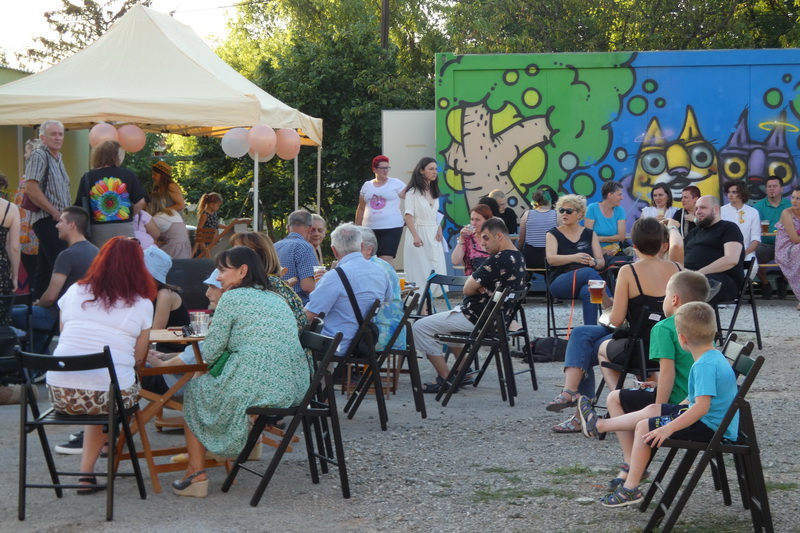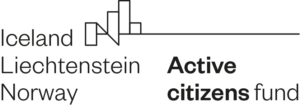ASSOCIATION IKS – “OUR COMMUNITY, OUR RESPONSIBILITY”
Posted 04.04.2024.

GOOD NEWS FOR ASSOCIATION IKS
Association IKS from Petrinja has received organizational support from the Active Citizens Fund, opening up new opportunities for the development of the organization and strategic planning of activities important to the community and its people. On this occasion, we spoke with one of IKS’s employees, Nadja Matešić, who shared how crucial this support was for them.

IN A CSO, YOU HAVE TO BE A JACK-OF-ALL-TRADES
Combining business with pleasure also means learning new insights from the field—things you often won’t find in reports that civil society organizations submit for review. Such was our conversation with Nadja Matešić, an employee of Association IKS, who points out the sounds that have become normal in post-earthquake Petrinja as we sit at a small table in front of the container space where the organization is based. Nadja recalls how she was just 15 when she started volunteering for the organization. Until she turned 16, she thought the war scars on buildings were a normal sight. Yet, despite everything, she knew she couldn’t imagine leaving Petrinja — this was her home.
“I was a longtime volunteer with the association but never wanted to end up working in the civil sector. I simply resisted it. I saw it as something like a hobby—something that feeds the soul, not a place where I could build a career. Here, you have to be a jack-of-all-trades, constantly researching, learning new things, hitting burnout, and then pulling yourself out of it. I have to admit that I was frustrated when I realized that in this sector, meeting formal requirements is often more important than the actual content of the work. At some point, I ended up leading a youth project in Berlin, where I saw the opportunities this sector offers. Since then, I’ve evolved—I can write and implement projects on my own. But bureaucratic burdens still bother me, as they often take priority over the actual work. Honestly, I feel like people in this sector have to be a little crazy, because it quickly becomes a whole lifestyle.” As Nadja shares her thoughts, she simultaneously greets international volunteers gathering in the organization’s space.
Organizational support for Association IKS came at the right time, Nadja emphasizes, and continues: “From my perspective, ACF stepped in right after the earthquake. I can’t even pinpoint the exact period anymore because everything was so chaotic at the time—we were all running on adrenaline. It seems to me that the role and function of this support evolved over the years. At the very beginning, it arrived at a moment of real crisis within our organization. Later, we were able to think about development and long-term sustainability. What mattered most to us was the feeling that someone recognized the importance of our organization and gave us an external push for progress.”
FINALLY, WE RECEIVED FLEXIBLE FINANCIAL SUPPORT
“The flexibility of this support was at a very high level, allowing us to use it in different ways. I remember how much we celebrated receiving organizational support because it was crucial for us to finally have funding that could contribute to our development—from strategic planning to attending various trainings and even team-building activities, which were much needed after the earthquake. To some, this might seem like a trivial thing, especially considering the range of ACF-supported initiatives, but as an employee, this organizational support meant a lot to me. After two years of planning, we finally had the opportunity for progress, growth, and self-reflection as an organization. Additionally, and this may sound trivial again, but securing basic work materials—even something as simple as toilet paper—is not something people outside of civil society organizations usually think about.“
TIME TO GET ORGANIZED
Nadja highlights that the team has faced numerous challenges in recent years—from the earthquake to construction work, during which they had to learn new skills such as tiling, changing lock cylinders and electrical fuses, climbing onto the metal roof of their container office to clear snow and water, planning excavation for water and sewage connections, reading architectural plans, and overseeing construction work. On top of that, they managed multiple projects independently or in partnership to maintain organizational stability during crisis situations.
“On multiple levels, this organizational support brought a fresh perspective to our team. I’d also highlight the great communication with the implementing body, which was always professional, supportive, and understanding. The people we worked with were professionals who truly understand our needs in the field—many of them had gone through different phases of NGO funding themselves and could speak our ‘civil society language.’ I never felt hesitant to reach out, ask questions, or seek help. The moment this support arrived was when things finally became a bit easier for us. Honestly, I think we would have burned out very quickly without it. This support gave us the space to breathe and realize it was time to get organized.”

IKS BEFORE AND AFTER THE EARTHQUAKE
“There is no moment when you rise and stay there forever. After the earthquake, I think we were running on adrenaline, re-evaluating our roles even outside the strategic plan we had as an organization. We shifted our focus to humanitarian work—running activities in the container settlement, taking work home, and dealing with constant challenges. At times, we were helping people with paperwork they needed after the earthquake; at other times, we were just having coffee with elderly women for whom that meant the world. The first two years after the earthquake were mostly about putting out fires while simultaneously trying to return to some sense of normalcy.”
NOW WE CAN FINALLY BREATHE
“The moment we could finally breathe came when we realized we had reached a state of both individual and organizational exhaustion—you know, that moment when you just keep going until you can’t anymore. Suddenly, we found ourselves in a situation where we no longer had to constantly put out fires, and that actually felt strange. We had been so tense, operating at full speed, and as soon as we stopped, we started feeling the burnout. Within our organization, we’ve always juggled multiple roles and gotten used to that way of working, but the post-earthquake period was even more complex. It pushed us into situations we never imagined we’d have to navigate.”
Nadja explains that IKS is now in a phase of finding balance—asking themselves: Where are we? What do we want? How can we achieve it?
“We’re no longer operating in fear like we were after the earthquake. Now, we need to focus on ourselves and what we, as an organization, actually want. We’re also working on making our container office space more functional. We understand that, given our current limitations, we will reach fewer people—but what matters is that the people we do reach receive quality support from us. Thanks to this organizational support, we’re no longer thinking short-term. Now, we’re planning for the future.” – Nadja shares this reflection over a cup of coffee.

WHAT DID THE IKS SOCIAL CENTER MEAN TO THE COMMUNITY BEFORE THE EARTHQUAKE, AND WHAT CAN IT BE NOW?
“Before the earthquake, it was a space where a few of us had our offices alongside a living room, library, and studio. Anyone from the community could drop by at any time and find some form of support. It was a safe space where you were always welcome, where you could express your ideas—structured or not, it didn’t matter. That’s the kind of energy we want to bring into this container space, but it’s incredibly challenging. The physical perception of the space has changed, and we have to be adaptable. We have to be less sensitive to distractions and accept that, right now, we simply cannot organize large-scale activities the way we used to. That’s a difficult adjustment. There’s a lot of stress in realizing that you can’t operate the way you did before a major crisis—in this case, the earthquake. Suddenly, everything needs to be adjusted.”
The reality is that people in Petrinja will always measure time as ‘before’ and ‘after’ the earthquake. Nadja explains that they quickly pivoted to organizing pop-up events—because their space disappeared in a matter of seconds. As we talk, we look over at the old ruins of what used to be the IKS Social Center. On one of the remaining walls, a phrase still stands: “Be the change you want to see in the world.”

HERE, THEY CAN BE WHOEVER THEY WANT TO BE
“It feels like our community is still in a kind of psychotic state. That didn’t happen immediately after the earthquake—back then, we were all running on adrenaline, just trying to survive the stress. But now, the consequences are setting in. Everyone is drained, trends are shifting. This was the city center—but it’s gone. Now, we have to help people rediscover that this is still the same place, just in a different space.” – Nadja speaks with a spark of enthusiasm as she recalls the 20th anniversary celebration of IKS—held in what is essentially a ruin.
“The range of people who came was incredible—from ages 3 to 80. We had directors of international organizations sharing space with Grandma Ljuba, the woman we brought blankets to during the earthquake. These people would probably never have met otherwise. It was a rare moment where we could actually celebrate, even after everything that happened to our town. Events like these restore my faith in what we do as an organization—because at the end of the day, the most beautiful part of our work is the direct connection with people.” She pauses, already anticipating the next question, which she admits is a tough one: How important is association IKS to the community?

“Simply by the fact that we are still here, I believe we are important to the community. Things are happening and being produced, we have a function. We have quite a few formal recognitions such as various certificates and confirmations behind us, but the experience of our users is actually the most important feedback for us. The fact that our users return to our space, schools continue to want to collaborate with us, and other partners reach out, is actually an indicator that we are important to the community and that we are doing well what we do.” – Nadja concludes and continues to dream.
UTOPIA OR REALITY – IKS IN TWO YEARS?
“Where do I see the organization in two years? Hmm, I hope in a stable form. It would be great if we could expand the team. I see myself in Petrinja, I want to work with rural schools in the community. Actually, I see us here where we are, just a little better, more structured, and calmer.”

